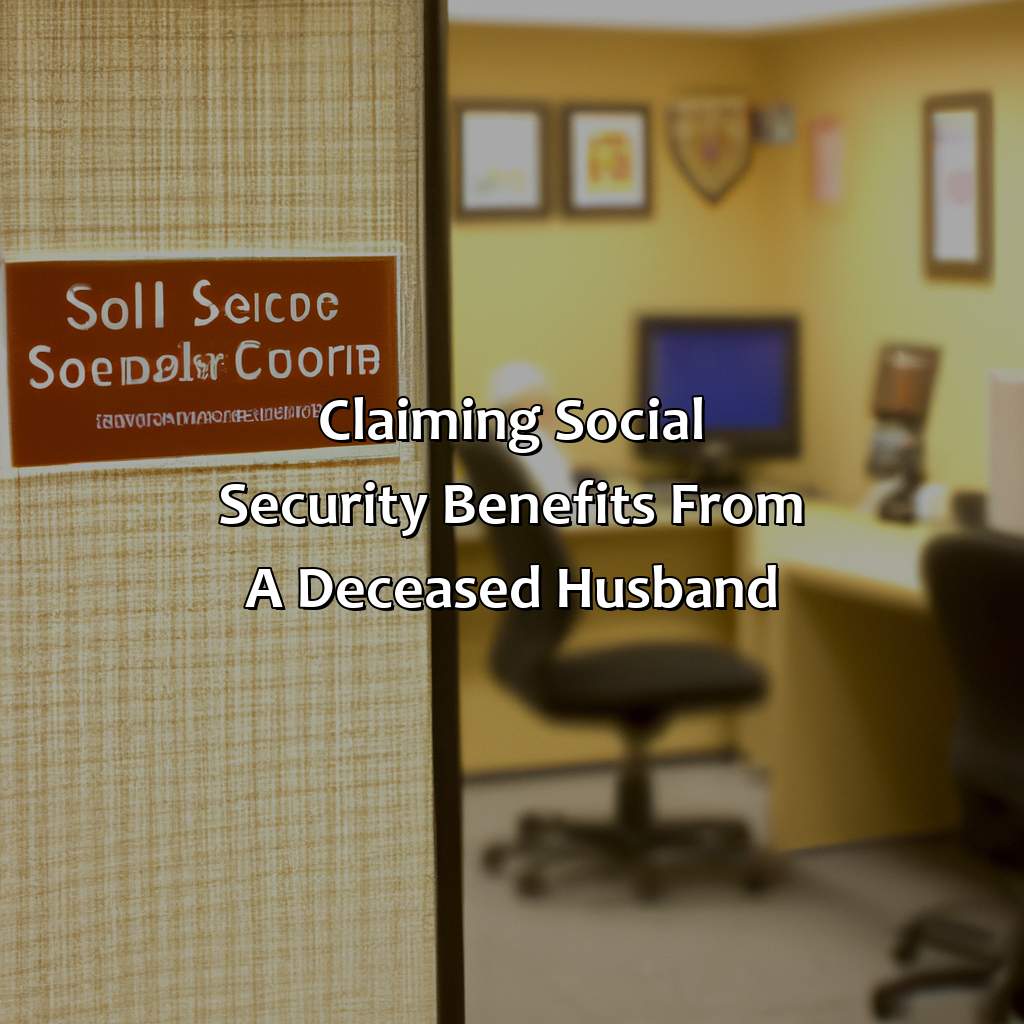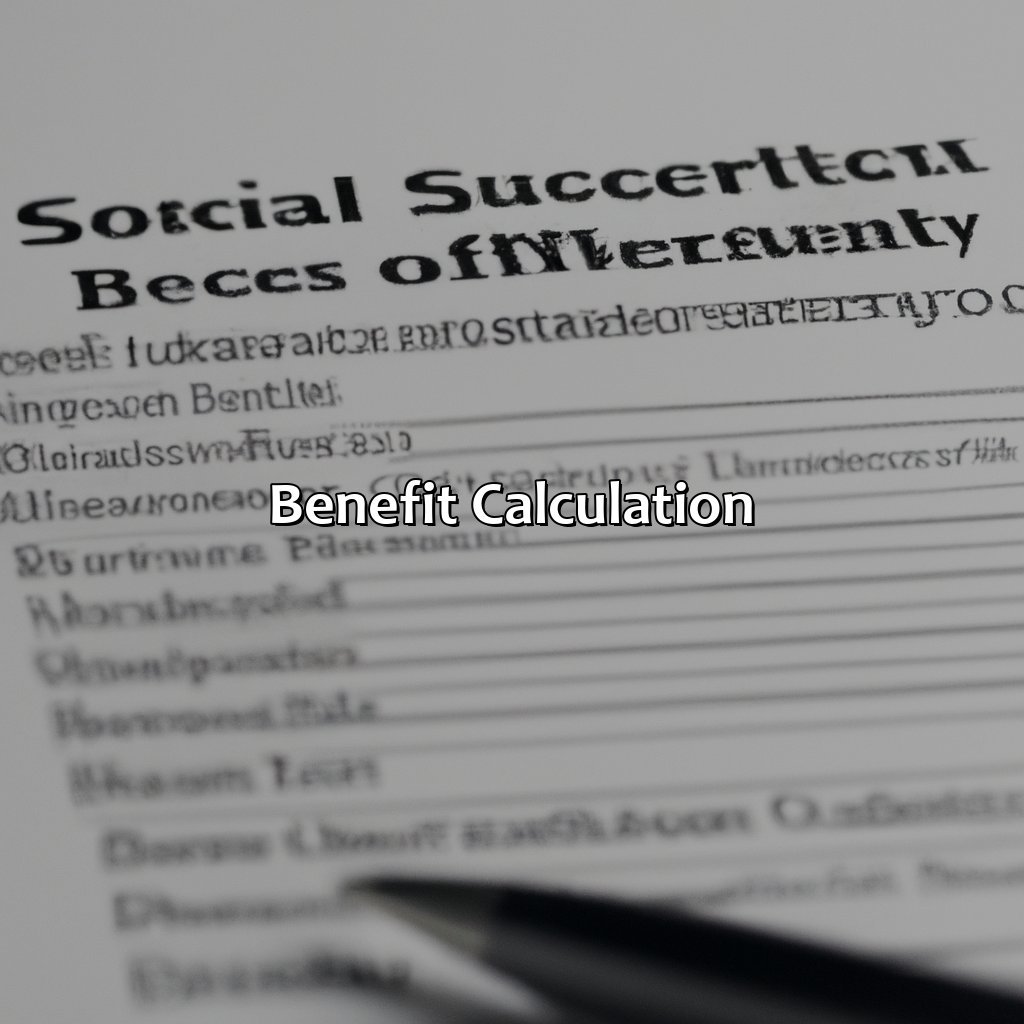When Can I Draw Social Security From My Deceased Husband?
Key Takeaway:
- Eligibility for Social Security Benefits: As a surviving spouse, you may be eligible for Social Security benefits if you were married to your deceased husband for at least 9 months before his death. If you are divorced, you may also be eligible if you were married to your former spouse for at least 10 years and have not remarried.
- Claiming Social Security Benefits from a Deceased Husband: Timing of Claim and Required Documents: You can claim Social Security benefits as a surviving spouse as early as age 60 or as early as age 50 if you are disabled. You will need to provide certain documents, such as your marriage certificate and your husband’s death certificate, to apply for benefits.
- Benefit Calculation: Survivors Benefit vs. Retirement Benefit and Reductions and Adjustments to Benefits: The amount of your benefit will depend on whether you are claiming a survivors benefit or a retirement benefit, your husband’s earnings history, and your own earnings history. Your benefit may be reduced if you claim it before your full retirement age or if you are also receiving certain other benefits, such as a pension.
- Applying for Social Security Benefits: Online Application Process and In-Person or Phone Application Process: You can apply for Social Security benefits online, by phone, or in person at your local Social Security office. It is important to make sure you have all the necessary documents and information before you apply to ensure that the process is smooth and efficient.
Are you a widow facing the difficult dilemma of when and how to draw Social Security benefits from your deceased husband? You’re not alone. This article provides a comprehensive guide to help you understand when you can draw Social Security benefits.
Eligibility for Social Security Benefits
To qualify for Social Security Benefits, you must have contributed to the program for a certain number of years. These benefits extend to eligible family members, including spouses, children, and divorced spouses. In some cases, even a surviving spouse can receive benefits based on the deceased spouse’s work record. The length and type of marriage, age, and health of the surviving spouse play roles in determining eligibility.
To claim Social Security benefits from a deceased spouse, the surviving spouse must have been married to the deceased for at least nine months. The survivor must be at least 60 years old or at least 50 years old and disabled. If divorced, the survivor may also qualify if the marriage lasted 10 years or longer. Surviving spouses can receive a percentage of the deceased spouse’s Social Security benefits.
It is crucial to note that the surviving spouse can’t receive both their earned benefits and their deceased spouse’s benefits. Instead, they will receive whichever amount is highest.
According to history, the laws around surviving spouse Social Security benefits have changed over time. In the past, eligibility was limited, but now, surviving spouses have more significant financial support available.
Image credits: retiregenz.com by James Duncun
Claiming Social Security Benefits from a Deceased Husband
Timing is essential to claim Social Security benefits from a deceased husband. Check out the “Claiming Social Security Benefits from a Deceased Husband” section in the “When can I draw Social Security from my deceased husband?” article. Here, you’ll discover the optimal moment to submit the claim and the necessary documents. To make the process simpler, check out the sub-sections.

Image credits: retiregenz.com by Adam Washington
Timing of Claim
When to Claim Social Security Benefits after a Spouse’s Death
To receive social security benefits from your deceased spouse, timing is crucial. If you are at least 60 years old, you can claim survivor benefits as early as age 50 if you’re disabled or have a qualifying disability. The earliest age for non-disabled widows or widowers is 60.
Additionally, claiming benefits before reaching full retirement age reduces your monthly payment amount. So, if you are eligible for both survivor and your own benefits, be mindful of the best time to start collecting each one.
According to the Social Security Administration, over 7 million people received survivor benefits in 2020.
Fun fact: The first social security payment was made on January 31st, 1940 to Ida May Fuller.
Be prepared to dig up more than just memories, as the list of required documents for claiming social security benefits may have you reaching for a shovel.
Required Documents
To claim Social Security Benefits from a Deceased Husband, several documents are required.
- The first document needed is the Death Certificate of your spouse.
- You’ll need to present your Marriage License or Certificate that validates your marriage with deceased.
- You’ll have to submit the social security number of both you and your husband in writing.
- If you want to apply for survivor’s benefits at 62; birth certificate information will be necessary as well.
It is important to note that if you remarry before the age of 60, you won’t be eligible for survivor benefits and all other legal documents. These documents must be updated regularly. A proper arrangement and organization can simplify your process.
One time a woman named Mary who lived in Pennsylvania shared her story. She had to gather all these documents after her husband passed away. However, she had lost her marriage documentation so it turned into quite an issue for her. Luckily, she was able to get everything sorted out by contacting local government agencies and filing some paperwork. It took some time, but eventually, she was able to receive survivor’s benefits from Social Security without further delay.
Calculating social security benefits is like trying to solve a Rubik’s cube, except the cube is made of bureaucracy and the colors keep changing.
Benefit Calculation
Find out how much benefit you can get from your late husband. Check the Benefit Calculation Section. It has two Sub-sections:
- Survivors Benefit
- Retirement Benefit
Plus, there might be Reductions and Adjustments to Benefits.
Let’s explore the differences between these two. See what reductions or changes might apply.

Image credits: retiregenz.com by Adam Duncun
Survivors Benefit vs. Retirement Benefit
When Can I Apply for Social Security After My Spouse’s Death? Here’s What You Need to Know.
If you’ve lost your spouse, you may be eligible for survivor benefits from the Social Security Administration. Here are some key points to consider when deciding between acquiring Retirement Benefit or Survivor Benefit:
- Survivor benefit allows you to receive up to 100% of your late spouse’s benefit amount, while retirement benefit only offers maximum 50% of your spouse’s benefit.
- You can apply for survivor benefits as early as age 60, but with a reduced amount. However, if you’re disabled, benefits can begin at age 50 or younger.
- If you have not reached full retirement age, taking survivor benefits will not decrease your own retirement benefits later on.
- If your spousal benefit is less than what you’d get based on your earning history, it makes sense to delay applying until both payments are equalized.
Lastly, keep in mind that survivors who remarry before age 60 (or age 50 if disabled) generally lose eligibility for their deceased spouse’s benefits. Don’t let fear of missing out make you wait longer than necessary – explore all your options and file just as soon as it works best for your situation.
Who knew that death could bring both a reduction in stress and a reduction in social security benefits?
Reductions and Adjustments to Benefits
Reductions and Adjustments to Social Security Benefits
- Early retirement: If you retire before full retirement age, your benefit amount will be reduced based on the number of months you receive benefits before reaching full retirement age.
- Delayed retirement: If you choose to delay your retirement beyond full retirement age, your benefit amount will increase up until age 70.
- Earnings test: If you’re below full retirement age and earning more than a certain limit while receiving benefits, your benefits may be reduced.
- Cost-of-Living Adjustment (COLA): Social Security benefits may be adjusted each year due to inflation, but this adjustment cannot exceed a certain percentage.
It is important to note that reductions and adjustments in benefits can affect the amount of monthly benefit a beneficiary receives. A beneficiary should consider the timing of his/her decision on when to start receiving social security benefits as it can have long-term consequences.
If you’re not sure about the best time to start claiming your social security benefits or if you want professional advice on additional strategies for increasing your benefit income, please consult with a knowledgeable financial advisor. Don’t miss out on potential opportunities for increasing social security income.
Ready to retire and become a social security recipient? All it takes is a few forms, some patience, and the realization that your golden years may be filled with less gold than anticipated.
Applying for Social Security Benefits
Apply for social security benefits? You have two ways: online or by phone. Here’s the low-down!
Sub-sections:
- Online Application Process
- In-Person/Phone Application Process

Image credits: retiregenz.com by Yuval Jones
Online Application Process
The process of applying online for Social Security Benefits can be initiated by the surviving spouse of a deceased husband. Here’s a guide on how to go about it.
- Visit the official website of Social Security Administration (SSA).
- Choose ‘Apply for Benefits’ and your relationship with the deceased.
- Fill in all necessary information asked by the application form.
- Submit required documents like birth certificate, marriage certificate, and death certificate if requesting survivor benefits.
- Check for confirmation of application submission from SSA.
- Await their decision and payment instructions.
If you are not certain about the criteria or documentation required to file an online application, SSA has clear guidelines and instructions on their website. It is important to note that eligibility depends on various factors such as age, relationship status, employment history, and other specific circumstances unique to individual cases.
A woman who recently lost her husband found relief in applying online for assistance after being intimidated by visiting their local SSA office. She was grateful for the easily accessible information online that provided guidance throughout the application process.
In-Person or Phone Application Process
When submitting an application for Social Security benefits, there are two ways you can proceed. The options include submitting your application over the phone or attending an appointment for an in-person application process.
- Phone Application Process: This is a great option if you are unable to visit the SSA office due to health issues, disability, or age. You will need to call 1-800-772-1213 and request that an SSA representative assists you with your application.
- In-Person Application Process: An in-person appointment may be beneficial for those who need additional support with their application. At an SSA office, a representative will help determine eligibility and benefit calculation while answering any questions you may have.
- To schedule your appointment, call 1-800-772-1213 or visit the Social Security website to locate your nearest office.
- Documents Required: You must present identification documents such as birth certificate, driver’s license, marriage certificate, income tax forms of spouse (if married).
- Language Option: SSA offers foreign language services which are available via phone once scheduled appointment has been made.
- If applying on behalf of the deceased spouse contact 1-800-772-1213 number so that they can guide during phone conversation.
It’s important to remember that each person’s situation is unique and requires individual attention from SSA representatives. While either option can be convenient for some people, it’s always wise to consult with an expert before making any significant decisions about when and how to apply for these benefits.
It is possible that individuals may experience some delay with their In-Person appointments due to understaffing at certain locations causing longer wait times; therefore patience must be practiced when visiting a location.
Five Facts About Drawing Social Security From a Deceased Husband:
A surviving spouse can start drawing social security as early as age 60, but at a reduced rate. (Source: SSA.gov)
If the surviving spouse waits until full retirement age, they can receive 100% of their deceased spouse’s social security benefit. (Source: AARP)
The amount a surviving spouse can receive is based on their age, the deceased spouse’s earnings history, and when the deceased spouse started to draw their own benefits. (Source: Investopedia)
If a surviving spouse remarries before age 60 (or age 50 if disabled), they are not eligible to draw social security benefits from their deceased spouse. (Source: SSA.gov)
Surviving spouses who remain unmarried until age 60 (or age 50 if disabled) may choose to receive the larger of either their own or their deceased spouse’s social security benefit. (Source: AARP)
FAQs about When Can I Draw Social Security From My Deceased Husband?
When can I draw social security from my deceased husband?
You must have reached full retirement age (currently 66) to claim Social Security benefits based on your deceased husband’s earnings record. If you are disabled, you can begin collecting survivor benefits as early as age 50.
Do I need to have been married for a certain amount of time to qualify for survivor benefits?
Yes, you must have been married to your deceased spouse for at least nine months before he passed away to qualify for survivor benefits.
What is the maximum amount of survivor benefits I can receive?
The amount of survivor benefits you receive will depend on your deceased husband’s income record. The maximum amount you can receive is 100% of your husband’s Social Security benefit.
Can I receive survivor benefits if I am already receiving my own Social Security benefits?
If your own Social Security benefits are less than your deceased husband’s survivor benefits, you can receive the difference between the two benefits. The Social Security Administration will pay you the higher of the two benefits, but not both.
Can I still work while receiving survivor benefits?
Yes, you can still work while receiving survivor benefits. However, if you earn more than a certain amount each year, your benefits may be reduced. For 2021, the earnings limit is $18,960.
Does remarriage affect my eligibility for survivor benefits?
Remarriage after age 60 (50 if disabled) will not affect your eligibility for survivor benefits. If you remarry before age 60 (50 if disabled), you will not be eligible for survivor benefits based on your deceased husband’s earnings record.
 Checkout this IRS Loophole
Checkout this IRS Loophole 
